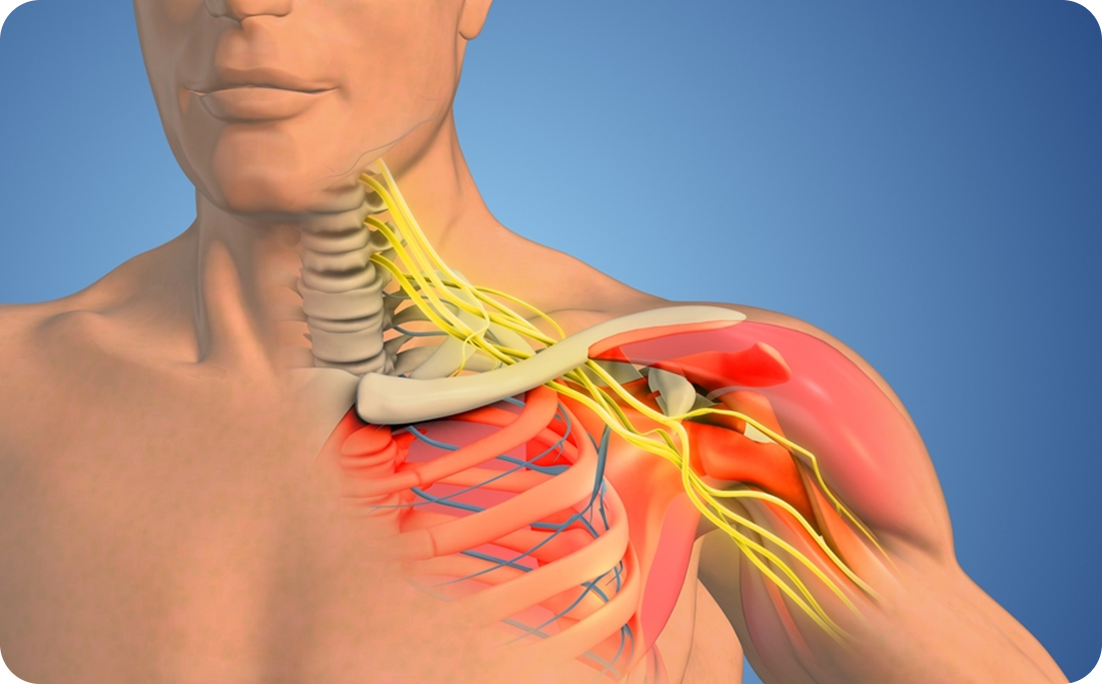Minor brachial plexus injuries, often known as stingers or burners, are prevalent in contact sports like football. Babies can develop brachial plexus injuries during birth. Other disorders that might affect the brachial plexus include inflammation and malignancies.
The most serious brachial plexus injuries are frequently caused by car or motorbike accidents. Severe brachial plexus injuries can result in arm paralysis, however, surgery may be able to restore function.
Brachial plexus injuries disrupt all or part of the communication between the spinal cord and the arm, wrist, and hands. This may mean you are unable to utilize your arm or hand. Brachial plexus injuries frequently cause complete loss of sensation in the affected area.
The severity of a brachial plexus injury varies according to the part of the nerve involved and the amount of the injury. Some people's functions and feelings return to normal, while others may suffer from lifetime problems as a result of being unable to use or feel a portion of their arm.
What are the different types of brachial plexus injuries?
The severity of brachial plexus injuries varies significantly, depending on the type of damage and the amount of force involved. The same event can harm multiple brachial plexus nerves of varied severity.
The primary types of brachial plexus injuries are:
- Neuropraxia occurs when a brachial plexus nerve is gently stretched, causing damage to its protective coating. This disrupts nerve signal conduction but does not necessarily cause harm to the nerve below. It may heal on its own or require basic, nonsurgical treatment, such as physical therapy, to restore normal function.
- Rupture occurs when a brachial plexus nerve tears partially or completely due to excessive stretching. Surgical intervention is frequently used to treat these types of injuries.
- Avulsion is the most severe form of brachial plexus injury. It occurs when a nerve root breaks away from the spinal cord. These types of injuries necessitate surgery to restore function.
Causes
Damage to the top nerves that comprise the brachial plexus occurs when the shoulder is pressed down as the neck stretches up and away from the damaged shoulder. When the arm is forced above the head, the lower nerves are more vulnerable to damage.
These injuries may arise in a variety of ways, including:
- Contact sports. Many football players endure burners or stingers, which occur when nerves in the brachial plexus are stretched past their limits after collisions with opposing players.
- Difficult births. Newborns may develop brachial plexus damage. These may be linked to high birth weight, breech presentation, or extended labor. Erb's palsy is most commonly caused by an injury to the higher nerves.
- Trauma. Brachial plexus injuries can come from a variety of traumas, including car accidents, motorbike accidents, falls, and bullet wounds.
- Cancer diagnosis and treatment options. Radiation therapy to the chest or neck can induce tumors to form in or along the brachial plexus, impose pressure on the brachial plexus, or spread to the nerves.
Brachial Plexus Injury Symptoms
The severity of the injuries and their location along the length of the brachial plexus determine the symptoms. Injuries to nerves that originate lower in the brachial plexus impact the arm, wrist, and hand.
- Common signs of a brachial plexus injury include numbness or loss of feeling in the hand or arm.
- Lack of control over shoulders, arms, wrists, and hands.
- The arm hangs limply.
- Severe and sudden pain in the shoulder or arm, including burning and stinging.
- Pain from a brachial plexus injury can range from mild to severe, transitory to chronic, depending on the kind and extent of the injury.
Case Study By

Dr Nishant Soni
(MBBS, MS-Ortho)
Experience
Hand & Reconstructive
Micro Surgeon with 13 yrs
as specialist
Work in Stats till 2023
5000+ Carpal Tunnel Surgery
10010+ Hand Fractures
3000+ Wrist Surgeries
40000+ Happy Patients
Associations
Medanta MedCity
SCI International Hospital
Medanta MedCity
SCI International Hospital
Read More


